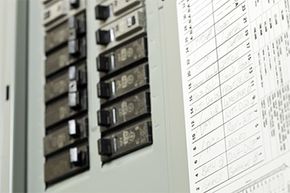Safety Devices: Fuses
Fuses and circuit breakers are safety devices. Let's say that you did not have fuses or circuit breakers in your house and something "went wrong." What could possibly go wrong? Here are some examples:
- A fan motor burns out a bearing, seizes, overheats and melts, causing a direct connection between power and ground.
- A wire comes loose in a lamp and directly connects power to ground.
- A mouse chews through the insulation in a wire and directly connects power to ground.
- Someone accidentally vacuums up a lamp wire with the vacuum cleaner, cutting it in the process and directly connecting power to ground.
- A person is hanging a picture in the living room and the nail used for said picture happens to puncture a power line in the wall, directly connecting power to ground.
When a 120-volt power line connects directly to ground, its goal in life is to pump as much electricity as possible through the connection. Either the device or the wire in the wall will burst into flames in such a situation. (The wire in the wall will get hot like the element in an electric oven gets hot, which is to say very hot!).
Advertisement
A fuse is a simple device designed to overheat and burn out extremely rapidly in such a situation. In a fuse, a thin piece of foil or wire quickly vaporizes when an overload of current runs through it. This kills the power to the wire immediately, protecting it from overheating. Fuses must be replaced each time they burn out, which is why very few homes still use them.
A circuit breaker uses the heat from an overload to trip a switch, and circuit breakers are therefore resettable. Power enters the home through a circuit breaker panel. Inside the circuit breaker panel are two primary wires from the transformer entering the main circuit breaker at the top. The main breaker lets you cut power to the entire panel when necessary. Within this overall setup, all of the wires for the different outlets and lights in the house each have a separate circuit breaker or fuse.
If the circuit breaker is on, then power flows through the wire in the wall and makes its way eventually to its final destination, the outlet.
